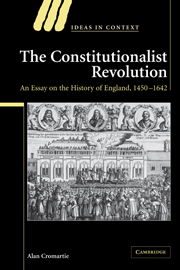Book contents
- Frontmatter
- Contents
- Acknowledgements
- Introduction
- 1 Fortescue's world
- 2 St German's world
- 3 Reformation and the body politic
- 4 Commonwealth and common law
- 5 Puritans and Anglicans
- 6 James, kingship, and religion
- 7 Law, politics, and Sir Edward Coke
- 8 The constitutionalist revolution
- Epilogue: the constitutionalism of John Locke
- Bibliography
- Index
- IDEAS IN CONTEXT
7 - Law, politics, and Sir Edward Coke
Published online by Cambridge University Press: 10 December 2009
- Frontmatter
- Contents
- Acknowledgements
- Introduction
- 1 Fortescue's world
- 2 St German's world
- 3 Reformation and the body politic
- 4 Commonwealth and common law
- 5 Puritans and Anglicans
- 6 James, kingship, and religion
- 7 Law, politics, and Sir Edward Coke
- 8 The constitutionalist revolution
- Epilogue: the constitutionalism of John Locke
- Bibliography
- Index
- IDEAS IN CONTEXT
Summary
After the Revolution, quite understandably, some writers saw law as intrinsically subversive. Thomas Hobbes's friend and patron the earl of Newcastle felt able to tell Charles II that ‘after the Reformation, and dissolution of the abbeys, then the Law crept up, and at last grew to be so numerous, and to such a vast body, as it swelled to be too big for the kingdom, and hath been no small means to foment and continue this late and unfortunate rebellion’. If the size of the profession was any sort of guide to its importance, then Newcastle's hypothesis was not unreasonable. During the 1520s, the number of active barristers was probably approximately fifty; a century later there may have been five hundred, a figure that of course ignores the numerous ‘attorneys’, offering various informal services, who attached themselves to every jurisdiction.
The increase in demand for litigation affected all types of tribunal, including the church courts, but the two ancient courts of Westminster Hall appear to have been the most important beneficiaries. Suggestively, the period when expansion was most rapid was the prosperous early decades of Queen Elizabeth's reign; a speech made by Christopher Hatton in June 1588 remarked that ‘there are now more at the bar in one House, than there was in all the Inns of Court, when I was a young man’. All these new barristers had plenty of new business to cope with: between 1563 and 1580, the number of suits in King's Bench nearly quintupled.
- Type
- Chapter
- Information
- The Constitutionalist RevolutionAn Essay on the History of England, 1450–1642, pp. 179 - 233Publisher: Cambridge University PressPrint publication year: 2006



